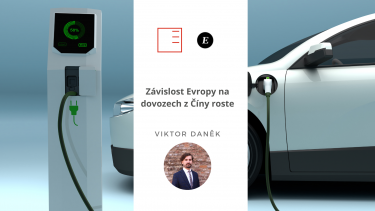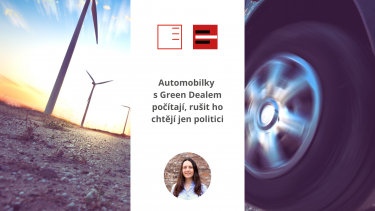e15 | Green Deal will not end after the EU elections. It needs to be brought back down to earth and wrapped in more attractive paper
This weekend's European Parliament elections will strongly influence the EU agenda for almost the rest of the decade. In particular, the future fate of Green Deal is of great curiosity. After the frenetic green activity of the last five years, the political winds are turning and the appetite for tackling climate change is waning. Filip Křenek, Project Coordinator and Analyst at EUROPEUM Institute, comments on the situation for e15.
Show more
Ekonomický deník | Europe's dependence on imports from China is growing
The essential components needed to grow the modern economy include chips and semiconductors, solar panels and batteries for electric cars. All of these are imported into Europe from Asian countries instead of manufacturing capacity being built here. Viktor Daňek, deputy director of EUROPEUM Institute, said it is necessary to open a debate on the reform of the common budget and new revenues.
Show moreiRozhlas.cz | Automobile companies are on board with the Green Deal, it is only politicians who want to scrap it
The Green Deal for Europe is an ambitious strategy to ensure that Europe becomes the first climate-neutral continent by 2050. Most of the parties running for the European Parliament want to change this strategy, despite the fact that the car companies are already anticipating the transition. EUROPEUM Institute researcher Kateřina Davidová commented on the topic in an article for iRozhlas.cz.
Show more
RevivEU | Should we fear for the economic future of Europe?
We invite you to a public podcast recording focusing on the discussion of the impacts of the COVID-19 pandemic on European industrial policy and its potential consequences for the Czech economy and society. We will discuss the new technological dynamics resulting from the pandemic and explore ways in which the European Union can respond to technological competition with the USA and China.
Show moreHospodářské noviny | More than five million people will need to be retrained in the Czech Republic by 2030. Car industry will mainly face the problems
The Czech car industry is lagging behind the rest of Europe and the world. It may not be able to pick what to produce, but it has the opportunity to strengthen its competitiveness and resilience. However, it needs trained and educated employees, which are hard to find on the local labour market. So are we going to train the automotive workforce, strengthen the position of our strategic sector and promote a just transformation? Or are we going to continue to say that the transition to electric mobility does not concern us and that the Green Deal for Europe is to blame for increased unemployment? How to produce electric cars and remain competitive? Rebeka Hengalová, a researcher at EUROPEUM Institute, discusses this topic in her article for economic daily Hospodářské noviny.
Show moreDeník N: More aid to Ukraine, EU enlargement and Chinese electric cars. European Commission chief unveils her plans for next year
EUROPEUM Institute analyst Vít Havelka commented on Ursula von der Leyen's State of the Union speech, in which the European Commission President covered a number of key topics for the current and future development of the EU.
Show more
Report | Round table - Electric cars and jobs: How to prepare for changes in the automotive industry?
On June 20, 2023, the EUROPEUM Institute for European Policy organized a closed round table entitled Electric cars and jobs: how to prepare for changes in the automotive industry?. The debate was attended by experts from the Ministry of Labor and Social Affairs and the Ministry of the Environment, as well as from international research organizations, institutions of the European Union, the private sector and, last but not least, representatives of trade unions operating in the automotive industry. The report was written by Rebeka Hengalová.
Show moreE15: EU emission standards will not be enough for China. Beijing is preparing its own rules
The EU countries have decided that the sale of new cars with internal combustion engines will end by 2035 at the latest. Although this is a highly controversial move in the Czech Republic, it is unlikely to be of much significance in the context of the global new car market. The new Euro 7 emissions standard will be the same. Our Senior Research Fellow Vít Havelka commented on this topic.
Show more
Policy Paper | The future is electric: role of Visegrad countries in the EV battery supply chain
The car industry is a crucial player for the economies of each Visegrad country, but to remain competitive adaptation is necessary. Since the shift from ICE to EVs leads to a substantial need for Critical Raw Materials (CRM), the V4 countries have and must continue to position themselves along the different parts of the EV battery supply chain from mining, refining to manufacturing, reuse and recycling as well as R&D into new battery chemistries. The future is electric: role of the Visegrad countries in the EV battery supply chain report addresses areas for Visegrad countries to ensure a sustainable and reliable EV battery supply chain.
Show more PDF
Policy Paper | The future is electric: role of Visegrad countries in the EV battery supply chain
Automobilový průmysl je pro ekonomiky všech visegrádských zemí klíčovým hráčem, ale pro zachování konkurenceschopnosti je nutné se mu přizpůsobit. Vzhledem k tomu, že přechod od vozidel s vnitřním spalovacím motorem k elektrickým vozidlům vede ke značné potřebě kritických surovin (Critical Raw Materials - CRM), země V4 se musely a musejí i nadále snažit zaujmout pozici v různých částech dodavatelského řetězce baterií pro elektrická vozidla, od těžby, rafinace až po výrobu, opětovné použití a recyklaci, jakož i výzkum a vývoj nových chemických technologií baterií. Zpráva The future is electric: Role of the Visegrad countries in the EV battery supply chain (Budoucnost je elektrická: role zemí Visegrádu v dodavatelském řetězci baterií pro elektromobily) se zabývá oblastmi, v nichž mohou země Visegrádu zajistit udržitelný a spolehlivý dodavatelský řetězec baterií pro elektromobily.
Show more PDF
Staroměstské náměstí 4/1
Prague 1 - Staré Město
110 00
tel.: +420 212 246 552
email: europeum@europeum.org
https://www.europeum.org








